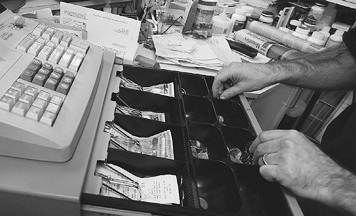Tax will change the process for claiming work expenses
Jamie Golombek
Sun

Not all work expenses are subject to HST. Photograph by: Aaron Lynett, National Post, Financial Post
If you’re an employee who has to pay some of your own expenses for which you are not reimbursed by your employer, chances are that many of these expenses include a component of GST or HST.
If this is the case, you should ensure that you are claiming the GST or HST rebate, as appropriate.
This will become more important for Ontario and B.C. employees, who on July 1 may start paying an extra 8% on some previously untaxed, non-reimbursed expenses.
Under the Income Tax Act, an employee can only deduct “the cost of supplies that were consumed directly in the performance of the duties of … employment and that the … employee was required by the contract of employment to supply and pay for.”
To claim these expenses, you need your employer’s acknowledgement on Form T2200, the Declaration of Conditions of Employment.
To get a rebate of the GST/ HST you paid on these expenses, you need to complete another form — Form GST370, the Employee and Partner GST/ HST Rebate Application form. You claim the rebate on line 457 of your income tax return.
Note that you can only claim a rebate if your employer was a GST/HST registrant and your employer is not a listed financial institution, which includes banks, investment dealers, trust companies, credit unions or insurance companies.
Also, you can only apply for a rebate of the GST or HST you actually paid. So, for example, you can’t claim the rebate if you purchased supplies from a small merchant who didn’t have to collect the GST/HST since its sales for the year were under $30,000.
Similarly, travel expenses outside of Canada would not have had a GST/HST component associated with them and no rebate can be claimed on those expenses either.
When it comes to meals and entertainment, keep in mind that since only 50% of such expenses are deductible, you can only apply for the rebate on 50% of the GST/HST paid on those expenses.
While you should file Form GST370 with your tax return for the year in which you deducted the expenses, if you forgot to file it for 2009, you can send it in separately, along with an explanatory letter, to your tax centre, being sure to indicate in your letter the tax year for which you are claiming the rebate.
You have up to four years from the end of the year to which the expenses relate to file an application. So, for 2009, you have up until Dec. 31, 2013.
Finally, when you receive the GST/HST rebate, you have to include it in your income for the year in which it is received. If you recently received your GST/ HST rebate that you claimed on your just-filed 2009 return, you will have to include it on Line 104 of your 2010 return that you file next spring.
Including this income makes sense, since it simply reverses the deduction you took in the prior year for the GST/HST paid on various employment expenses, which was subsequently reimbursed to you by the government and therefore is no longer considered an out-of-pocket deductible expense.
-Jamie Golombek, CA, CPA, CFP, CLU, TEP is the managing director, tax and estate planning, with CIBC Private Wealth Management in Toronto.
© Copyright (c) The Vancouver Sun

